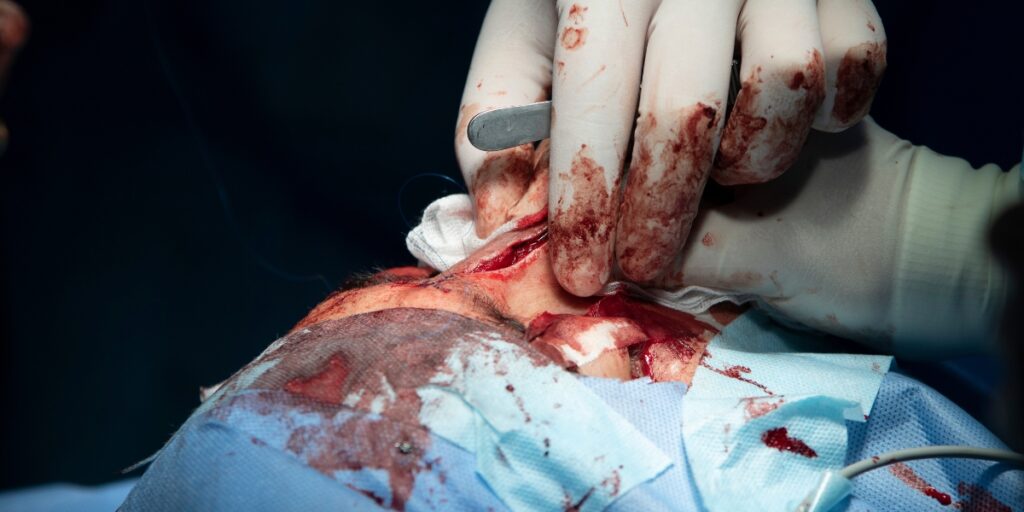Cocaine Nose

Typical media portrayals of cocaine users show sniffling and wiping their noses, with some laughing it off as a case of “coke nose.” Cocaine does cause people to get runny noses, but cocaine nose, or coke nose, complications are much more dangerous and can lead to changes in appearance, pain, and fatal infections.
In the United States, as many as 30 million adults use cocaine yearly; almost six million develop a cocaine use disorder and need professional treatment to overcome their cocaine addiction. Additionally, some cocaine users with severe coke nose require reconstructive surgery.
What Is Cocaine Nose?
Cocaine nose, or coke nose, is an umbrella term that refers to various injuries in the nose and sinuses from snorting cocaine. The damage caused by cocaine can range from a bloody nose to long-term structural and tissue damage requiring plastic surgery.
The National Library of Medicine states, “It is widely known that the habit of snorting cocaine is associated with a particular type of drug-induced chronic rhinitis, which leads to inflammation of the sinonasal mucosa, slowly progressing to a destruction of nasal, palatal, and pharyngeal tissues.”
In simple terms, this means cocaine abuse causes damage to the inside of the nose, sinuses, the roof of the mouth, and the throat.
What Does Cocaine Do to Your Nose?
Simply put, cocaine eats away at your nose. Powdered cocaine is abrasive to mucus membranes, which make up the lining of the nose.
The microscopic tears caused by coke and the additives used to cut it allow the particles to enter the bloodstream quickly, and because the nasal cavities and blood flow are so close to the brain, the high is almost immediate.
Cocaine causes the blood vessels in the nose to constrict, reducing blood flow and damaging the nose’s lining.
Short-term cocaine use can cause a stuffy nose, runny nose, bloody nose, sinus infections, and sore throat from the mucus dripping through the nasal cavities into the back of the throat, according to The National Institutes on Drug Abuse (NIDA).
Long-term cocaine abuse can cause long-term permanent damage to the nose, including the tissue and cartilage in and around the nose to rot and die off due to lack of blood flow and infections.
Long-Term Effects of Cocaine Use
The long-term effects of cocaine use include various side effects and health risks. Some cocaine users will also smoke crack cocaine if they cannot get powdered cocaine. Smoking and injecting cocaine increases the risk of infections and other long-term damage.
Long-term side effects of cocaine use include:
- Paranoia
- Weightloss
- Anxiety
- Depression
- Loss of sense of smell
- Soft tissue damage around the nose, mouth, and face
- Nerve damage
- Insomnia
- Respiratory infections
- Lung damage
- Kidney damage
- Liver Damage
- Heart damage
- Stroke
- Sexual dysfunction
- Infected injection sites
- Collapsed veins
- Tooth decay
- Gum disease
- Bowel decay
- Brain aneurysm
- Heart attack
- Withdrawal symptoms
People with mental health disorders have an increased risk of experiencing cocaine psychosis, which can cause disturbing and violent thoughts and actions.

Nose Damage From Cocaine Abuse
Most nose damage from cocaine abuse results from prolonged abuse; however, people who binge or snort an excessive amount of cocaine in a short amount of time can also cause damage. Some nose-related complications of cocaine abuse will heal on their own with abstinence from cocaine; others require medical intervention and plastic surgery.
Cocaine Nose Bleeds
Cocaine damages the blood vessels in the nose, making them more prone to injury from rubbing, itching, or even bumping the outside or inside of the nose. Coke also dries out the mucus membranes, making them crack or form sores that bleed. When blood flow returns to normal, the blood vessels can burst, causing a nosebleed. When people snort cocaine, they typically use a straw, rolled-up money or paper, or a key; any of these can scrape and damage the lining of the nose, causing further damage and bleeding.
Cocaine nose bleeds can be difficult to stop because the tissue doesn’t heal and clot as quickly as undamaged tissue. In extreme cases, frequent nose bleeds may require doctors to cauterize blood vessels in the sinuses; however, most doctors won’t do this for active cocaine users because it is pointless, as the tissue will get damaged again.
Sinus Infections
The mucus in your nose is vital to trapping and expelling bacteria and irritants before they get into the body and cause infections. Cocaine causes the mucus to dry up and makes it easier for germs and contaminants to enter the nasal cavities. Sinus infections are painful and unpleasant, but they can also lead to bacteria and viruses entering the bloodstream and sepsis, which can be fatal.
Antibiotics can treat most sinus infections; over time, antibiotics become less effective, and the risk of severe complications from infections increases.
Saddle Nose
The nose gets its shape from cartilage down the middle, called the septum or the bridge of the nose. Repeated cocaine use causes the tissue to lose blood flow, rot, and collapse of the nose, causing a flattened or dipped down area, resembling a horse saddle, hence the name saddle nose.
Plastic surgeons can usually repair a saddle nose with an implant or take cartilage from the person’s pelvic bone or ribs and graft it into the face. Because saddle nose is primarily a cosmetic problem, many insurance companies will not cover it, and reconstruction can be painful and expensive.
Septal Perforation
Septal perforation, sometimes called nasal perforation, is when the septum, the cartilage that runs through the middle of the nose and separates each nasal cavity, doesn’t get enough blood flow, and pieces rot away, causing holes between the two sides.
People incorrectly assume that cocaine burns a hole through the tissue; while cocaine can be acidic, it is not that powerful. Instead, cocaine causes repeated damage and affects the immune system, making it harder to heal the damage promptly. Septal perforation causes nose bleeds, interferes with mucus regulation, and causes breathing problems that produce a whistling sound.
If doctors notice septal perforations early, they will treat them with lubricating gels and other medications; however, larger ones often require surgery.
Damaged Nasal Septum (Deviated Septum)
A damaged nasal septum, or deviated septum, happens when one side of the nose has most of the damage, causing the septum to fall to one side. Deviated septums change the shape of the nose and interfere with airflow, causing headaches, sinus pressure, snoring, and increased sinus infections.
Doctors can repair a deviated septum with reconstructive surgery.
Hard Palate Damage
Hard palate damage is one of the most severe complications of cocaine abuse. The hard palate is the bone that forms the roof of the mouth and separates the nasal cavity and the mouth. Repeated and long-term damage and infections wear away at the hard palate, causing holes to form.
Once the hard palate has holes, food and drink will enter the nose from the mouth, the sound of the voice can change, and there’s an increased risk of dental infections and tooth loss. Doctors cannot always repair hard palate damage; if they can, it requires major reconstructive surgery or dental implants.
Most doctors will not perform reconstructive surgeries on patients still using cocaine and frequently require them to complete a cocaine addiction treatment program before considering surgery.

Cocaine Addiction Treatment
If you or a loved one are struggling with the mental and physical tolls of cocaine addiction, help is available.
At Northridge Addiction Treatment Center, we tailor treatment plans to each resident’s unique needs while ensuring comfort, dignity, and privacy.
Our onsite medical detox, medication-assisted therapy, and personal chef-catered gourmet meals give your body the balance and nutrients it needs to start healing. At the same time, our compassionate and licensed staff works with you to address the roots of addiction with evidence-based therapies.
We look forward to helping you find your path to a fulfilling, healthy, and life-long recovery. Reach out to us today.
Find Meaningful Recovery
Our caring and compassionate specialists are eager to help you comfortably navigate this journey to recovery. Our individualized treatment plan, programs, and therapies may be a perfect match for you or your loved one. Let us assist you in living the happy life you deserve. It starts with a phone call.




